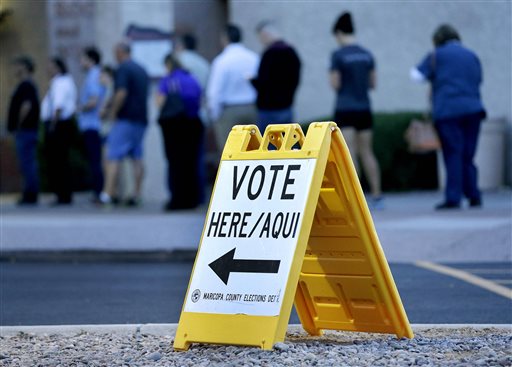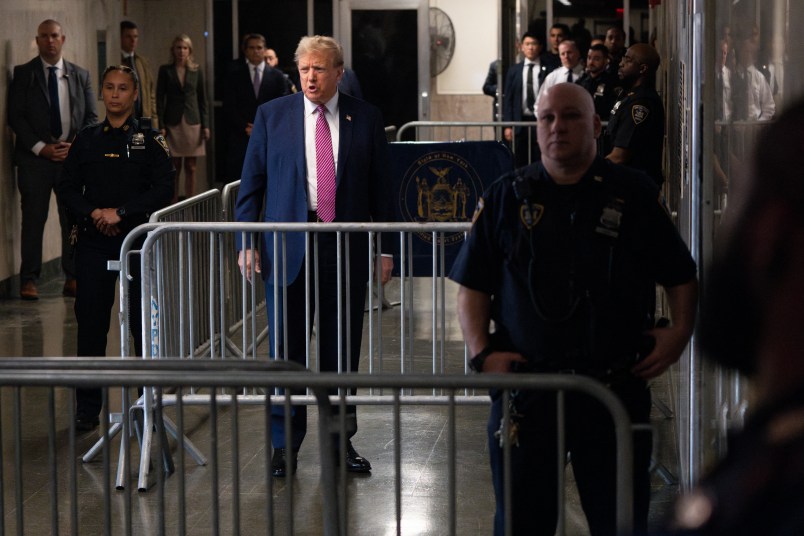PHOENIX (AP) — The U.S. Supreme Court could decide as early as Saturday if it will take up an appeal of an Arizona ballot collection law that was blocked after Democrats argued it hindered minorities from voting.
The 9th U.S. Circuit Court of Appeals on Friday blocked the new state law that makes it a felony for groups to go door to door to collect early ballots and deliver them to the polls. It is an especially effective tactic in minority communities, and Democrats and some voters allege the law hurts minorities’ ability to vote.
The 11-judge panel said by blocking the law it was preserving the status quo for Tuesday’s election, which could come down to the wire in Arizona as Democrats spend heavily to get out the vote from Latinos and others angered by Donald Trump’s anti-immigrant comments.
The law is one of two that Democrats have challenged.
The appeals court used the same reasoning to keep in place a ruling that ballots should not be counted if voters go to the wrong polling place to cast them. But the judges agreed to review it in January for future elections.
Democrats say Arizona throws out more ballots cast at incorrect polling locations than any other state and that minorities are more likely to be affected. In the most populous counties, voters must go to their assigned polling place if they vote in person or their ballots are rejected. In 2012, nearly 11,000 ballots were disqualified.
In the ballot collection law, the state filed an emergency appeal to the U.S. Supreme Court. Justice Anthony Kennedy ordered the Democratic plaintiffs to file a response by Saturday morning.
In blocking it, the 9th Circuit set a hearing for January on making it permanent. Five of the 11 judges opposed the move.
Chief Judge Sidney Thomas wrote that the decision will not add or remove any valid votes. He said the law criminalized delivering someone else’s early ballot, which would still be counted.
GOP Gov. Doug Ducey signed the law enacted by the Republican-dominated Legislature early this year, calling it a common-sense effort to protect the integrity of elections and eliminate voter fraud. A spokesman for Ducey said the governor’s office was reviewing the order.
Both parties have used ballot collection to boost turnout during elections by going door to door and asking voters if they have completed their mail-in ballots. Voters who have not are urged to do so, and the volunteers offer to take the ballots to election offices. Democrats, however, use it more effectively.
The law does not prevent voters’ family members or caregivers from turning in ballots.
Arizona Republican Party Chairman Robert Graham said the law is constitutional.
“I think the 9th Circuit ruling quite honestly is pathetic,” Graham said. “It is about voter integrity.
“Anybody that says that they can’t get to the mailbox to drop off their ballot when they have 29 days to do it should be embarrassed,” Graham added.
Spencer Scharff of the Arizona Democratic Party called it a win for voters.
“We are committed to ensuring that everyone has not just the right to vote, but the ability to vote,” Scharff said. “And being able to assist a voter to turn in their mail-in ballot is critical to that goal and achieving full access to the ballot box.”
Besides Democrats, several independent groups hailing the ruling are gearing up for ballot collection efforts, with one saying its volunteers plan to pick up ballots after being summoned by text message.
___
Associated Press writer Astrid Galvin contributed to this story.
Copyright 2016 The Associated Press. All rights reserved. This material may not be published, broadcast, rewritten or redistributed.









